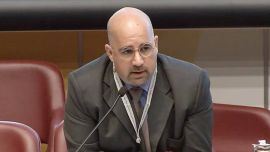The first anniversary of Javier Milei’s government finds Peronism united but disorganised. With the few governors who survived the 2023 elections trying to pass by unnoticed, the centre of attention moves to Buenos Aires Province where the opposition party maintains its main figures. Today, they barely manage to share a photo (without even posing) and are far from resolving their differences.
The image is old. Peronism already understood for the 2019 election that unity was the path. Now it is repeating: unity, unity, unity. If any possibility of returning to power exists, it is only together.
But differences also exist and the path towards the next elections is not so clear. At last Monday’s meeting of the Buenos Aires Province branch of the Partido Justicialista (PJ), in which leading figures Cristina Fernández de Kirchner, Sergio Massa and Axel Kicillof all participated, they tried to project a scenario of harmony. There were some hitches because, in reality, nobody wanted a genuine debate. It was much like a Christmas dinner, in which no member of the family is ready to ruin the get-together, preferring to hold their peace.
As a guest at the meeting, new national PJ chair Cristina Fernández de Kirchner mentioned the need to understand that the political enemy to combat is President Javier Milei. But then she also spoke of the infighting in which Kirchnerism has been trapped for some months now.
“I’ve often heard being told to back Axel. When I made him [my economy] minister, I supported him, while half the Cabinet cursed me and when I chose him as gubernatorial candidate, I supported him, while half the mayors cursed me,” she complained.
At the end of her speech when the meeting was already winding up, Buenos Aires Province Community Development Minister Andrés ‘Cuervo’ Larroque asked to take the floor. There were no longer any microphones but Máximo Kirchner gave him one anyway. Larroque said: “Nobody had any doubts about support in 2019 but I’m asking for support now with Milei in government and Axel as the option for the future.” That’s where it all ended.
The most vocal critics of the current Peronist leadership in the hands of CFK and Máximo Kirchner in Buenos Aires Province were not present. Avellaneda Mayor Jorge Ferraresi and national deputy Victoria Tolosa Paz preferred to stay away. The latter had complained at the February meeting that there were no representatives of Kicillof, nor was he invited. Now that he had showed up, she decided not to.
This sector of Peronism, which has Ferraresi as its most visible face but which includes other mayors such as Mario Secco (in Ensenada), promises to present their own lists in the next election. Unity in Buenos Aires Province is proclaimed but not assured.
The differences are not just over leadership and future electoral candidates. As Perfil has already anticipated, the leaders cannot agree over how Buenos Aires Province should go to the ballot-boxes next year.
Fernández de Kirchner believes that next year’s midterms, when the list of national deputies will be elected by a single paper ballot, should be held on the same day the provincial categories are elected by the traditional system. What the former two-term president is proposing is the nationalisation of the elections, so that the citizenry will go to the polling-booths to definitively endorse the Milei administration or not. She assures that if the voting is on different dates, the focus will be on BA province, centring on tales of crimes and other provincial problems.
Massa also goes for concurrent elections on the same day with different systems. He recalls that if many provinces had not held their elections on different dates last year, Unión por la Patria might have clinched the three extra percentage points to win in the first round.
In La Plata they do not think likewise: “Sixteen governors cannot all be wrong and a bunch of idiots,” as they say about the different provincial election dates to which they are accustomed. They do not fear a provincial focus to the election because they assure that in a clash between Kicillof and Milei, the Buenos Aires Province governor leads by several heads in his own territory.
Besides, in La Plata they say that the 84 Peronist mayors all want their elections on a different date to the national. But the PJ stays mum.
“It was not the time to discuss it but I don’t know why they are in such a hurry if it can be worked out in April. It’s still not known whether there will be PASO primaries or whether they will be eliminated and they want to impose voting which will only occasion chaos for the people of Buenos Aires Province,” say sources in La Plata’s government house.
Fernández de Kirchner, meanwhile, on Wednesday formally took over the national PJ leadership. In this first year of the Milei government, Peronism barely lost three seats in the Chamber of Deputies and avoided any exodus in the Senate (a positive balance bearing in mind the disintegration it suffered after the defeat against Mauricio Macri). But the PJ chair aims to bring into line those in the opposition caucus who in recent votes benefitted the Milei government with carefully timed absences and votes.
It won’t be easy. Some of those legislators respond to Peronist governors who until now have preferred to maintain good links with the Casa Rosada. Unión por la Patria only managed to hang onto six provinces in last year’s election, of which only four of their provincial heads resist: Axel Kicillof, Gildo Insfrán (Formosa), Ricardo Quintela (La Rioja) and Sergio Ziliotto (La Pampa).
In contrast, Osvaldo Jaldo (Tucumán) immediately placed his deputies at the service of the Casa Rosada with Raúl Jalil of Catamarca following suit.






















Comments